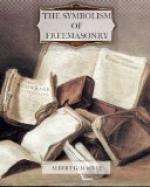[130] Jamblichus says that Pythagoras passed over from Miletus to Sidon, thinking that he could thence go more easily into Egypt, and that while there he caused himself to be initiated into all the mysteries of Byblos and Tyre, and those which were practised in many parts of Syria, not because he was under the influence of any superstitious motives, but from the fear that if he were not to avail himself of these opportunities, he might neglect to acquire some knowledge in those rites which was worthy of observation. But as these mysteries were originally received by the Phoenicians from Egypt, he passed over into that country, where he remained twenty-two years, occupying himself in the study of geometry, astronomy, and all the initiations of the gods ([Greek: pa/sas theo~n teleta/s]), until he was carried a captive into Babylon by the soldiers of Cambyses, and that twelve years afterwards he returned to Samos at the age of sixty years.—Vit. Pythag, cap. iii., iv.
[131] “The sacred words were intrusted to him, of which the Ineffable Tetractys, or name of God, was the chief.”—OLIVER, Hist. Init. p. 109.
[132] “Hu, the mighty, whose history as a patriarch is precisely that of Noah, was promoted to the rank of the principal demon-god among the Britons; and, as his chariot was composed of rays of the sun, it may be presumed that he was worshipped in conjunction with that luminary, and to the same superstition we may refer what is said of his light and swift course.”—DAVIES, Mythol. and Rites of the Brit. Druids, p. 110.
[133] “All the male gods (of the ancients) may be reduced to one, the generative energy; and all the female to one, the prolific principle. In fact, they may all be included in the one great Hermaphrodite, the [Greek: a)r(r)enothelys] who combines in his nature all the elements of production, and who continues to support the vast creation which originally proceeded from his will.”—RUSSELL’S Connection, i. p. 402.
[134] It is a tradition that it was pronounced in the following seven different ways by the patriarchs, from Methuselah to David, viz.: Juha, Jeva, Jova, Jevo, Jeveh, Johe, and Jehovah. In all these words the j is to be pronounced as y, the a as ah, the e as a, and the v as w.
[135] The i is to be pronounced as e, and the whole word as if spelled in English ho-he.
[136] In the apocryphal “Book of the Conversation of God with Moses on Mount Sinai,” translated by the Rev. W. Cureton from an Arabic MS. of the fifteenth century, and published by the Philobiblon Society of London, the idea of the eternal watchfulness of God is thus beautifully allegorized:—




